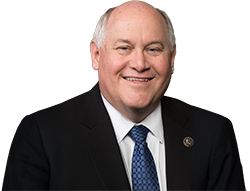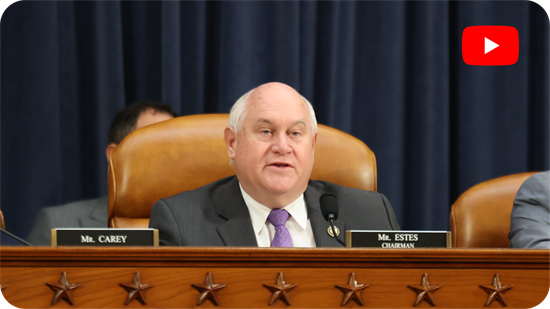Chairman Estes Oversees Social Security Subcommittee Hearing on Work Barriers for Americans Receiving Benefits
Washington,
September 9, 2025
|
Hannah Rawles
((202) 225-6216)
U.S. Congressman Ron Estes (R-Kansas) chaired a Social Security Subcommittee hearing on examining road blocks Americans, who have the desire to work but have disabilities or on supplemental income, are facing. Opening remarks as prepared are below. Watch the remarks on YouTube and Rumble. Chairman Estes’ questions for the witnesses can be viewed here.
Good afternoon, everyone. I want to welcome all our members and witnesses to today’s hearing. Thank you all for being here today – our first hearing since we celebrated the 90th anniversary of the Social Security Act on August 14th. I’d like to recognize and thank Chairman Smith and Congressman Carey, distinguished members of the Subcommittees on Social Security and Work and Welfare. As Chairman of the Social Security Subcommittee, I’ve made it a priority to strengthen and protect Social Security programs to better serve all Americans, including those with disabilities. This year it has been my pleasure to work closely with Social Security Commissioner Frank Bisignano, who we hosted here in June. And just this past Friday, the Commissioner came to Wichita where we held a productive meeting at the Social Security field office in my district. We discussed how Congress and the Social Security Administration can continue to deliver improved results to beneficiaries and recipients and I am confident this hearing will allow us to strengthen this partnership further. Today there are 1.7 million Americans missing from the workforce while, at the same time, we have over 7 million open jobs. This is not just a statistic; it's a call to action. It is crucial that we use the talents of every American able to work that we can. One of the most valuable, yet underutilized, talent pools in our country is Americans with disabilities. Especially given that many individuals with disabilities want to work. In fact, roughly 60 percent of Social Security Disability Insurance (DI) and Supplemental Security Income (SSI) recipients are interested in finding a job, gaining new skills, or advancing their careers. They are a critical resource we cannot ignore. I want to emphasize this is not about removing folks from their benefits. It’s about removing the barriers that hinder Americans with disabilities from renewing, strengthening, or forging a connection to the workforce. This hearing is about highlighting those barriers, understanding the complexities of the Social Security Administration's return-to-work programs, and exploring how we can improve transitions to work whenever possible. Today we will hear from individuals who have navigated these policies. The reality is that for those who want to work, the current system is complex and full of red tape. The existing DI and SSI programs are intended to support beneficiaries, but they are often so confusing that both individuals and employers need third-party experts to understand them. We also face the issue of outdated and slow administrative processes. For those who find work, the Social Security Administration's management of benefits can lead to overpayments. This isn't just a bureaucratic problem; it's a financial hardship that can discourage a person from continuing to work. The system is confusing. The complexity, red tape, and need to rely on third-party experts just to navigate the rules is a massive obstacle for both individuals and employers. I hope that this hearing will set the stage for a vital discussion about reform. This isn’t about altering the fundamental purpose of DI and SSI, but about modernizing our programs to work more effectively. We have an opportunity to remove government barriers, streamline communication, and modernize existing programs to help individual Americans who want to participate in the workforce. By doing so, we will not only improve individual lives but strengthen our economy as a whole. I would like to add my thanks to my colleague Representative Danny Davis, for your nearly three decades of service in Congress. Your commitment to your constituents and your tireless efforts to address the issues facing our nation. Your leadership and dedication will be missed on this committee. |








